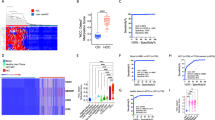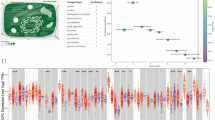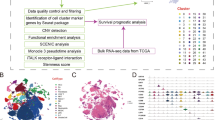Abstract
In this study we investigated tumour growth in relation to the immunohistochemical expression of p53 and bcl-2 and to patient survival data in 33 operated hepatocellular carcinomas (HCCs). In order to estimate the growth, a growth index, based on the degree of cell proliferation, apoptosis and necrosis, was calculated for each tumour. Cell proliferation was determined immunohistochemically by the number of proliferating cell nuclear antigen (PCNA)-positive cells in tumours, the extent of apoptosis was determined by counting the number of cells labelled by the in situ 3'-end labelling technique and tumour necrosis was estimated as the percentage of necrotic areas in haematoxylin--eosin-stained tissue sections. In our analysis we found that the survival of patients with HCCs showing a high growth index (i.e. tumours showing a high proliferation and simultaneously a low degree of apoptosis and necrosis) was significantly shorter than with other patients (P = 0.004, log-rank test). When analysed separately, cell proliferation, apoptosis or necrosis did not show any significant association with survival. p53 positivity was found in 8/33 (24%) of tumours. There were significantly more p53-positive cases in tumours with a high growth index (P = 0.01, Fisher's exact test) suggesting that dysfunction of the p53 gene may affect tumour growth. p53-positive cases did not, however, have a significantly shorter survival time than p53-negative cases (P = 0.3, log-rank test). bcl-2 positivity was found in only 1/33 (3%) of the HCCs. Thus bcl-2 overexpression does not seem to play an important role in hepatocellular carcinogenesis. In summary, our results suggest that in HCCs a compound score based on the evaluation of the degree of cell proliferation, apoptosis and necrosis is a biologically more relevant prognostic indicator than any of its composite parameters alone.
This is a preview of subscription content, access via your institution
Access options
Subscribe to this journal
Receive 24 print issues and online access
$259.00 per year
only $10.79 per issue
Buy this article
- Purchase on SpringerLink
- Instant access to full article PDF
Prices may be subject to local taxes which are calculated during checkout
Similar content being viewed by others
Author information
Authors and Affiliations
Rights and permissions
About this article
Cite this article
Soini, Y., Virkajärvi, N., Lehto, VP. et al. Hepatocellular carcinomas with a high proliferation index and a low degree of apoptosis and necrosis are associated with a shortened survival. Br J Cancer 73, 1025–1030 (1996). https://doi.org/10.1038/bjc.1996.199
Issue date:
DOI: https://doi.org/10.1038/bjc.1996.199
This article is cited by
-
Tumor necrosis as a poor prognostic predictor on postoperative survival of patients with solitary small hepatocellular carcinoma
BMC Cancer (2020)
-
TP53 immunohistochemical expression is associated with the poor outcome for hepatocellular carcinoma: evidence from a meta-analysis
Tumor Biology (2014)
-
In Vitro and In Vivo Evaluation of the Caspase-3 Substrate-Based Radiotracer [18F]-CP18 for PET Imaging of Apoptosis in Tumors
Molecular Imaging and Biology (2013)
-
Inhibitory effect of extract of fungi of Huaier on hepatocellular carcinoma cells
Journal of Huazhong University of Science and Technology [Medical Sciences] (2009)
-
Clinicopathological significance of tissue homeostasis in Indian breast cancer
Breast Cancer (2003)



